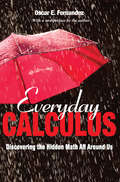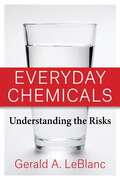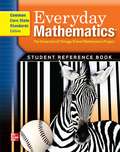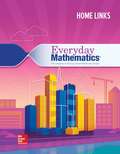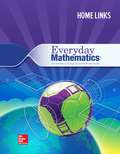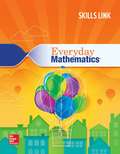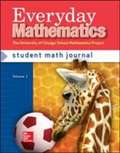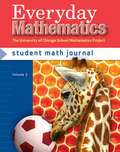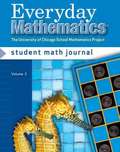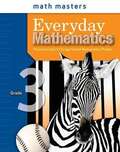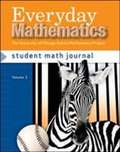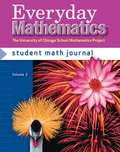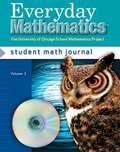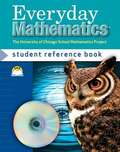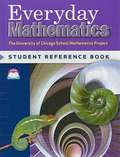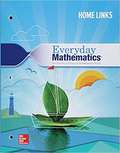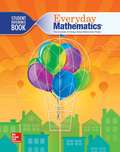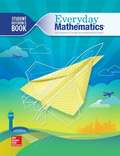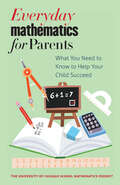- Table View
- List View
Everyday Calculus: Discovering the Hidden Math All around Us
by Oscar E. FernandezCalculus. For some of us, the word conjures up memories of ten-pound textbooks and visions of tedious abstract equations. And yet, in reality, calculus is fun and accessible, and surrounds us everywhere we go. In Everyday Calculus, Oscar Fernandez demonstrates that calculus can be used to explore practically any aspect of our lives, including the most effective number of hours to sleep and the fastest route to get to work. He also shows that calculus can be both useful—determining which seat at the theater leads to the best viewing experience, for instance—and fascinating—exploring topics such as time travel and the age of the universe. Throughout, Fernandez presents straightforward concepts, and no prior mathematical knowledge is required. For advanced math fans, the mathematical derivations are included in the appendixes. The book features a new preface that alerts readers to new interactive online content, including demonstrations linked to specific figures in the book as well as an online supplement. Whether you're new to mathematics or already a curious math enthusiast, Everyday Calculus will convince even die-hard skeptics to view this area of math in a whole new way.
Everyday Chemicals: Understanding the Risks
by Gerald A. LeBlancWhat is the likelihood that common chemicals such as bisphenol-A, which is found in plastic water bottles, are harming us? Should shoppers be concerned about pesticide residues on fruits and vegetables in the supermarket produce aisle? Are we risking adverse health effects when we use insect repellent that contains DEET or slather on sunscreen? Modern life requires us to navigate an endless sea of chemicals. How do we know whether we need to worry about them?This book is a layperson’s guide to understanding chemical risk. The toxicologist Gerald A. LeBlanc offers a nontechnical overview of the key factors in evaluating whether exposure to chemicals in our daily lives could be harmful. He leads readers through the basic concepts of risk assessment using real-world examples. LeBlanc emphasizes that chemical hazard depends on the level of exposure and provides practical strategies for sensible decision making. The book features a series of accessible case studies describing how we all can reach rational conclusions about the danger of typical chemical exposures we experience every day.Giving nonexpert readers the tools to understand chemical risks, this book shows how critical thinking and science literacy can help us live with less fear and anxiety and make reasonable choices when confronted with potential hazards.
Everyday Math: Student Reference Book (Grade #3)
by Max Bell Amy Dillard John Bretzlauf Jean BellA student material aimed at helping students find information quickly and fast in mathematics topics
Everyday Mathematics 4, Grade 4, Consumable Home Links (Everyday Math)
by McGraw-Hill Education StaffSupports daily classroom instruction and gives students a long-term record of their mathematical progress and development.
Everyday Mathematics 4, Grade 6, Consumable Home Links (Everyday Math Ser.)
by McGraw Hill*This textbook has been transcribed in UEB, formatted according to Braille textbook formats, proofread and corrected. <P><P>
Everyday Mathematics 4: Grade 3 Skills Link Student Booklet
by McGraw-Hill Staff Bell EtThese books provide extra cumulative practice on basic facts, computation, word problems, mental math, and estimation skills. Reinforce your daily lessons with additional review, practice, and test practice sheets all tied to individual Everyday Mathematics lessons.
Everyday Mathematics Grade 1, Math Masters
by The University of Chicago School Mathematics Project Andy Isaacs Diana Barrie Max Bell Amy DillardNIMAC-sourced textbook
Everyday Mathematics Grade 1, Student Math Journal Volume 1.
by The University of Chicago School Mathematics Project Diana Barrie Max Bell Amy DillaNIMAC-sourced textbook
Everyday Mathematics Grade 1, Student Math Journal Volume 2
by The University of Chicago School Mathematics Project Diana Barrie Max Bell Y Isaacs Amy DillaNIMAC-sourced textbook
Everyday Mathematics Grade 2, Math Masters
by The University of Chicago School Mathematics Project Diana Barrie Max Bell Amy Dillard Y IsaacsNIMAC-sourced textbook
Everyday Mathematics Grade 2, Student Math Journal Volume 2
by The University of Chicago School Mathematics Project Diana Barrie Max Bell Y Isaacs Amy DillaNIMAC-sourced textbook
Everyday Mathematics Grade 3, Math Masters
by The University of Chicago School Mathematics Project Diana Barrie Max Bell Y Isaacs Amy DillaNIMAC-sourced textbook
Everyday Mathematics Grade 3, Student Math Journal Volume 2
by Andy Isaacs Diana Barrie Max Bell Amy DillardNIMAC-sourced textbook
Everyday Mathematics Grade 4, Math Masters
by The University of Chicago School Mathematics Project Andy Isaacs Diana Barrie Max Bell Amy DillardNIMAC-sourced textbook
Everyday Mathematics Grade 4, Student Math Journal Volume 2
by The University of Chicago School Mathematics Project Andy Isaacs Diana Barrie Max Bell Amy DillardNIMAC-sourced textbook
Everyday Mathematics Grade 5, Math Masters
by The University of Chicago School Mathematics Project Andy Isaacs Diana Barrie Max Bell Amy DillardNIMAC-sourced textbook
Everyday Mathematics Grade 5, Student Math Journal Volume 2
by The University of Chicago School Mathematics Project Andy Isaacs Diana Barrie Max Bell Amy DillardNIMAC-sourced textbook
Everyday Mathematics Grade 5, Student Reference Book
by Andy Isaacs Diana Barrie Max Bell Amy DillardNIMAC-sourced textbook
Everyday Mathematics Grade 6, Student Reference Book
by The University of Chicago School Mathematics Project Andy Isaacs Diana Barrie Max Bell Amy DillardNIMAC-sourced textbook
Everyday Mathematics [Grade 2] Home Links (Everyday Math Ser.)
by Max Bell Jean Bell University of Chicago School Mathematics ProjectNIMAC-sourced textbook
Everyday Mathematics [Grade 3] Student Reference Book
by Max Bell Jean Bell University of Chicago School Mathematics ProjectNIMAC-sourced textbook
Everyday Mathematics [Grade 4]
by Max Bell Amy Dillard John BretzlaufComplete Package (25 Everything Math Decks and both Classroom Activity Guides)
Everyday Mathematics [Grade 4] Student Reference Book
by Max Bell Jean Bell University of Chicago School Mathematics ProjectNIMAC-sourced textbook
Everyday Mathematics [Grade 5] Student Reference Book
by Max Bell Jean Bell University of Chicago School Mathematics ProjectNIMAC-sourced textbook
Everyday Mathematics for Parents: What You Need to Know to Help Your Child Succeed
by The University of Chicago School Mathematics ProjectThe Everyday Mathematics (EM) program was developed by the University of Chicago School Mathematics Project (UCSMP) and is now used in more than 185,000 classrooms by almost three million students. Its research-based learning delivers the kinds of results that all school districts aspire to. Yet despite that tremendous success, EMoften leaves parents perplexed. Learning is accomplished not through rote memorization, but by actually engaging in real-life math tasks. The curriculum isn’t linear, but rather spirals back and forth, weaving concepts in and out of lessons that build overall understanding and long-term retention. It’s no wonder that many parents have difficulty navigating this innovative mathematical and pedagogic terrain. Now help is here. Inspired by UCSMP’s firsthand experiences with parents and teachers, Everyday Mathematics for Parents will equip parents with an understanding of EM and enable them to help their children with homework—the heart of the great parental adventure of ensuring that children become mathematically proficient. Featuring accessible explanations of the research-based philosophy and design of the program, and insights into the strengths of EM, this little book provides the big-picture information that parents need. Clear descriptions of how and why this approach is different are paired with illustrative tables that underscore the unique attributes of EM. Detailed guidance for assisting students with homework includes explanations of the key EM concepts that underlie each assignment. Resources for helping students practice math more at home also provide an understanding of the long-term utility of EM. Easy to use, yet jam-packed with knowledge and helpful tips, Everyday Mathematics for Parents will become a pocket mentor to parents and teachers new to EM who are ready to step up and help children succeed. With this book in hand, you’ll finally understand that while this may not be the way that you learned math, it’s actually much better.
